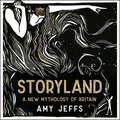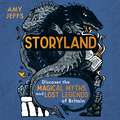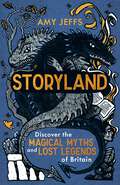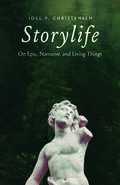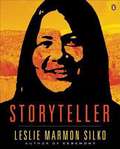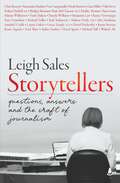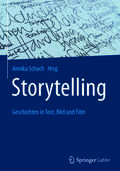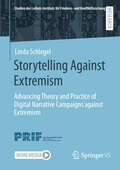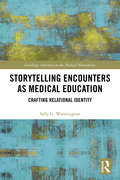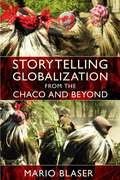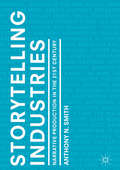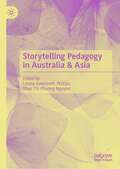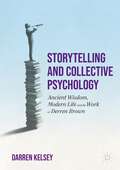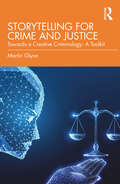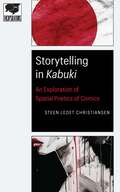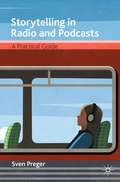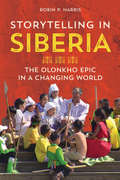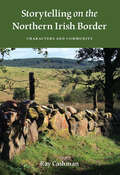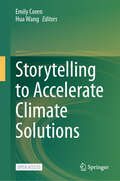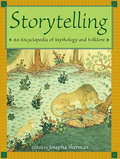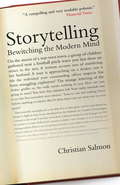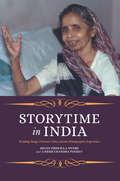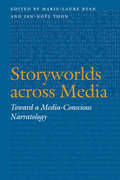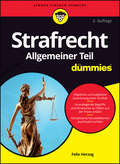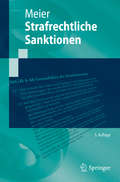- Table View
- List View
Storyland: A New Mythology of Britain
by Amy JeffsSoaked in mist and old magic, Storyland tells a history of Britain and the politics of its people through medieval eyes. Grounded in research, related as fiction, it begins before the Great Flood, with a troop of African giants quarrying stones. Later, the first migrants enter the Atlantic, calling themselves the Scoti and Britons, followed by the English and the Normans, crossing the North Sea. Storyland is ancient Britain as you have never seen it before, mediated by the modern aesthetic of its linocut illustrations. It is filled with places we know today and characters half-remembered: Lear in Leicester, Merlin in Stonehenge, Grim in Grimsby, St Columba on the River Ness. Storyland is a tale of legend, landscape and the yearning to belong.(P)2021 Quercus Editions Limited
Storyland: Discover the magical myths and lost legends of Britain - Children's Edition
by Amy JeffsIMMERSE YOURSELF IN MIST AND MAGIC AND DISCOVER HEROES AND MONSTERS RIGHT ON YOUR DOORSTEP.... You will have heard of Thor, Medusa and Hercules. But what about the myths of the British landscape? The Trojan heroes who wrestled giants. The Syrian sisters who found refuge on our lands. The dragons who slept in hollow hills. And the kings who communed with the dead... In this vivid mythology of Britain, children will discover enchanting tales of magic and adventure, giants and demons, princesses and prophecies.Travelling across the wildest of landscapes - as far north as Orkney and south as Cornwall, young listeners will be transported to sacred sites like Stonehenge, they will climb the mountains of Snowdon, dive into the Lochs of Scotland, and sail down the rivers of Britain, discovering a land steeped in myth, monsters and heroes.Adapted from Amy Jeffs' bestselling Storyland, this is a definitive and dynamic children's introduction to Britain's lost myth and legends.(P) 2023 Hodder & Stoughton Limited
Storyland: Discover the magical myths and lost legends of Britain - Children's Edition
by Amy JeffsIMMERSE YOURSELF IN MIST AND MAGIC AND DISCOVER HEROES AND MONSTERS RIGHT ON YOUR DOORSTEP . . .You will have heard of Thor, Medusa and Hercules. But what about the myths of the British landscape? The Trojan heroes who wrestled giants. The Syrian sisters who found refuge on our lands. The dragons who slept in hollow hills. And the kings who communed with the dead . . .In this vivid and beautifully illustrated mythology of Britain, children will discover enchanting tales of magic and adventure, giants and demons, princesses and prophecies.Travelling across the wildest of landscapes - as far north as Orkney and south as Cornwall - young readers will build Stonehenge with the young Merlin, chase hounds up the mountains of Wales, ride stags into the forests of Scotland and sail with Trojans along the rivers of Britain, discovering a land steeped in myth, monsters and heroes.Adapted from Amy Jeffs' beautiful and bestselling Storyland, this is a definitive and dynamic children's introduction to Britain's lost myths and legends.
Storylife: On Epic, Narrative, and Living Things
by Joel P. ChristensenFrom Homer’s epics to mainstream news, stories have lives of their own—and humans may not always control the narratives we create Combining ancient epic and myth with analogies from biology and the natural world, Joel P. Christensen explores the creative process and how narratives develop. This bold work urges readers to treat narratives as living things with their own agency in the world. Christensen starts by using Homeric epic to explore the way language and meaning develop alongside audiences in complex ecosystems and then moves through storytelling in the ancient Mediterranean over a thousand years. In this study, which ranges from the evolution of narratives to viral ideas, and to the dangerous side of stories in mass shootings and war, we see how narratives function as independent entities with consequences that cause lasting harm. Connecting his argument to the present day, Christensen addresses contemporary cultural panics, including AI and ChatGPT, “post-truth” or alt-facts in the digital age, and free speech and cancel culture. Storylife invites readers to rethink human creativity, the importance of collective actions, and the lives we build together with and against narrative. In an age rife with misinformation, it is time to reconsider how much control we have over stories and how to educate ourselves once we acknowledge the power that narrative exerts over us.
Storyteller
by Leslie Marmon SilkoNow back in print—a classic work of Native American literature by the bestselling author of Ceremony Leslie Marmon Silko's groundbreaking book Storyteller, first published in 1981, blends original short stories and poetry influenced by the traditional oral tales that she heard growing up on the Laguna Pueblo in New Mexico with autobiographical passages, folktales, family memories, and photographs. As she mixes traditional and Western literary genres, Silko examines themes of memory, alienation, power, and identity; communicates Native American notions regarding time, nature, and spirituality; and explores how stories and storytelling shape people and communities. Storyteller illustrates how one can frame collective cultural identity in contemporary literary forms, as well as illuminates the importance of myth, oral tradition, and ritual in Silko's own work. This edition includes a new introduction by Silko and previously unpublished photographs. .
Storytellers: Questions, Answers and the Craft of Journalism
by Leigh SalesHighly respected ABC anchor, bestselling author and hit podcaster Leigh Sales interviews the cream of Australian journalists about their craft – how (and why) they bring us the stories that inform our lives. Leigh Sales is one of Australia&’s most accomplished journalists, having anchored the ABC&’s flagship 7.30 program for twelve years. She has been a foreign correspondent, hosted Lateline and anchored numerous elections for the ABC. In this book, she turns her interviewing skills onto her own profession, those usually asking the questions: the journalists. In ten sections – from News Reporting to Editing, via Investigative, Commentary and of course Interviewing – Sales takes us on a tour of the profession, letting the leaders in their field talk direct to us about how they get their leads, survive in war zones, write a profile, tell a story with pictures, and keep the show on the road. A who&’s-who of Australian journalism – including Lisa Millar, Kate McClymont, Hedley Thomas, Trent Dalton, Benjamin Law, Tracy Grimshaw, Richard Fidler, David Speers, Stan Grant, Niki Savva, Waleed Aly, Annabel Crabb, Karl Stefanovic and Mia Freedman – talk candidly about their greatest lessons and their trade secrets. A fascinating insight into a vital and much-misunderstood profession, Storytellers is a book for anyone who&’s ever wanted to be a journalist, or even just wondered how the news gets made.
Storytelling
by Annika SchachDas Buch pr#65533;sentiert eine textlinguistische Analyse von Texten zur Unternehmensgeschichte und widmet sich dem vielzitierten Storytelling-Trend. Anhand von Textexemplaren der DAX30-Unternehmen werden die Textfunktion, Themenentfaltung und Formulierungsspezifika untersucht. Ein besonderer Schwerpunkt liegt in der Fragestellung, inwieweit Narration als Vertextungsstrategie verwendet wird und wie sich die Textexemplare in einer Typologie beschreiben lassen. Die Arbeit stellt zudem einen Bezug zum medienwissenschaftlichen Framing-Ansatz her.
Storytelling Against Extremism: Advancing Theory and Practice of Digital Narrative Campaigns against Extremism (Studien des Leibniz-Instituts für Friedens- und Konfliktforschung)
by Linda SchlegelCounter- and alternative narrative (CAN) campaigns have become a widely used tool in contemporary efforts to prevent and/or counter (violent) extremism (P/CVE). However, one element is conspicuously absent from the discourse: There is little engagement with CANs as narratives and neither CAN theory nor practice are based on existing research findings on narrative persuasion processes. This is a crucial gap in the current CAN approach. Not situating CANs within the broader discourse on narrative persuasion and drawing from the insights narrative persuasion studies offer significantly weakens the theoretical foundation, practical development, (storytelling) quality, and analysis of CAN campaigns. This book addresses this research gap and transfers concepts, theories, and insights from narrative persuasion and storytelling research to the context of P/CVE narrative campaigns. The author demonstrates that the often-criticized CAN approach can be improved significantly by understanding CANs as narrative persuasion campaigns and grounding them in existing research detailing how to tell entertaining and persuasive stories.
Storytelling Encounters as Medical Education: Crafting Relational Identity (Routledge Advances in the Medical Humanities)
by Sally G. WarmingtonThis innovative volume provides fresh perspectives on how medical students and patients construct identities in relation to each other, using stories of their clinical encounters. It explores how paying attention to medical students’ and patients’ stories in clinical teaching encounters can encourage empathy and the formation of professional identities that embody desirable values such as integrity and respect. Written by an experienced clinician and based on original, rigorous research combining ethnography and dialogic narrative analysis, Storytelling Encounters as Medical Education: Crafting Relational Identity includes patient stories alongside those of students and clinical teachers. This is an important contribution for all those interested in medical education, narrative medicine, person-centred care and identity formation in healthcare. It will also be of value to scholars in a range of other disciplines, who are using a dialogic approach.
Storytelling Globalization from the Chaco and Beyond
by Mario BlaserFor more than fifteen years, Mario Blaser has been involved with the Yshiro people of the Paraguayan Chaco as they have sought to maintain their world in the face of conservation and development programs promoted by the state and various nongovernmental organizations. In this ethnography of the encounter between modernizing visions of development, the place-based "life projects" of the Yshiro, and the agendas of scholars and activists, Blaser argues for an understanding of the political mobilization of the Yshiro and other indigenous peoples as part of a struggle to make the global age hospitable to a "pluriverse" containing multiple worlds or realities. As he explains, most knowledge about the Yshiro produced by non-indigenous "experts" has been based on modern Cartesian dualisms separating subject and object, mind and body, and nature and culture. Such thinking differs profoundly from the relational ontology enacted by the Yshiro and other indigenous peoples. Attentive to people's unique experiences of place and self, the Yshiro reject universal knowledge claims, unlike Western modernity, which assumes the existence of a universal reality and refuses the existence of other ontologies or realities. In Storytelling Globalization from the Chaco and Beyond, Blaser engages in storytelling as a knowledge practice grounded in a relational ontology and attuned to the ongoing struggle for a pluriversal globality.
Storytelling Industries: Narrative Production in the 21st Century
by Anthony N. SmithThis book shows how the unique characteristics of traditionally differentiated media continue to determine narrative despite the recent digital convergence of media technologies. The author argues that media are now each largely defined by distinctive industrial practices that continue to preserve their identities and condition narrative production. Furthermore, the book demonstrates how a given medium’s variability in institutional and technological contexts influences diverse approaches to storytelling. By connecting US film, television, comic book and video game industries to their popular fictional characters and universes; including Star Wars, Batman, Game of Thrones and Grand Theft Auto; the book identifies how differences in industrial practice between media inform narrative production. This book is a must read for students and scholars interested in transmedia storytelling.
Storytelling Pedagogy in Australia & Asia
by Louise Gwenneth Phillips Thao Thi Phuong NguyenThis book on teaching through story is the first to highlight the rich storytelling cultures of Australia and Asia. It presents insights from practicing storytelling educators from Black and White Australia, China, India, Japan, Thailand, and Vietnam, who share their art of storytelling as pedagogy. Designed for early childhood and primary teachers, teacher educators and student teachers across Australia and Asia, Storytelling Pedagogy in Australia & Asia provides inspiration to teach through storytelling to promote intercultural understanding, imagination, active citizenship and language and literacy learning. Each chapter includes told stories, and teaching and learning ideas to guide and encourage those who are new to the art of storytelling pedagogy and those wishing to expand their understanding of storytelling in Australia and Asia.
Storytelling and Collective Psychology: Ancient Wisdom, Modern Life and the Work of Derren Brown
by Darren KelseyThis book examines the work of psychological illusionist Derren Brown to understand the significance of storytelling and ancient philosophy in our society. Reflecting on the social disconnection and political polarisation of recent times, Darren Kelsey considers how we can rebuild a sense of collective cohesion and common good, weaving together contemporary psychology with ancient Stoicism to cut through the noise of modern life. Kelsey shows that Brown is more than a stage performer: he’s an enlightened magician who offers us guidance for navigating the challenges life throws at us, using his skills and wisdom to help us better understand ourselves and enable human flourishing. In this rigorous examination of Brown’s work, Kelsey makes a compelling case for paying closer attention to our personal, cultural and political stories and beliefs to help create a better future – for ourselves, our communities, and the planet.
Storytelling for Crime and Justice: Towards a Creative Criminology: A Toolkit
by Martin GlynnWhether it is doing a TEDx, presenting a podcast, sharing on social media, presenting at a conference, or pitching to a potential funder, engaging with storytelling and performance is now a prerequisite of an academics ‘modus operandi.’ Exploring the relationship between and the key concepts associated with storytelling and performance, crime, and criminology, this book offers practical tips and insights into creative methods for presenting research, disseminating criminological knowledge, giving lectures, and developing pedagogy.The book presents a reflexive account of the author's experiences of using creativity with incarcerated men and women. Drawing on a range of topics including ethical storytelling, presentation literacy, poetic inquiry, staging ethno-drama, crime fiction, and auto-ethnography, it makes a clear and compelling case for a creative criminology and a performative social science. Written by a seasoned criminologist, theatre director, storyteller, and dramatist, this is essential reading for all those interested in using creative methods of knowledge as a tool to explore the complex landscape of crime and justice.
Storytelling in Kabuki: An Exploration of Spatial Poetics of Comics (Encapsulations: Critical Comics Studies)
by Steen Ledet ChristiansenSteen Ledet Christiansen&’s Storytelling in &“Kabuki&” explores the series created by David Mack—a slow, recursive narrative that focuses on the death of Kabuki and her past. The series ran from 1994 to 2004 in a variety of miniseries, one-shots, and spin-offs, rather than following a conventional American monthly release schedule. Most of the series explores different perspectives on the same event and adds background to Kabuki&’s past, usually through surreal sequences, dreams, and near-death experiences. The flexibility of comics&’ approach to chronology, space, focalization, narrative, and fictionality enabled Mack to produce an unusual experience. Kabuki tells a story that can only exist via comics. Christiansen analyzes the visual design of the series, a heterogeneous collection of styles depending on the story. To understand Kabuki, it is crucial to explore the visual styles, as well as the use of visual and spatial rhymes and mixed media forms. Because Kabuki employs a complex layering of focalizations, diegetic levels, and metafictional self-reflectivity that is rare in mainstream American comics, it utilizes a narrative poetics that focuses on constant repeating, restating, and returning to the same events.Kabuki&’s unique compositional layering allows Christiansen to provide a clear example of how comics work while also expanding on critical vocabulary, especially in terms of spatial poetics. By exploring spatial form, Christiansen illuminates and gives a critical framework to a different and underexamined aspect of comics.
Storytelling in Radio and Podcasts: A Practical Guide
by Sven PregerThis textbook offers a practical guide to creating narratives in audio media. It is one of the most beautiful and complex tasks in radio and podcasting: how do you tell a compelling story and keep your listeners tuned in? In Storytelling in Radio and Podcasts, Preger offers practical answers to crucial questions: What material is suitable for long stories? How can I bind listeners to a real story for 15, 30 or 60 minutes? Or even get them excited about a whole series? How do I maintain suspense from beginning to end? How do I find my narrative voice? And, how do I develop a sound design for complex narratives? Richly illustrated using practical examples, the book guides the reader through various stages of developing a non-fiction narrative and examines structure, character development, suspense, narration, sound-design and ethics.
Storytelling in Siberia: The Olonkho Epic in a Changing World
by Robin P HarrisOlonkho , the epic narrative and song tradition of Siberia 's Sakha people, declined to the brink of extinction during the Soviet era. In 2005, UNESCO 's Masterpiece Proclamation sparked a resurgence of interest in olonkho by recognizing its important role in humanity 's oral and intangible heritage. Drawing on her ten years living in the Russian North, Robin P. Harris documents how the Sakha have used the Masterpiece program to revive olonkho and strengthen their cultural identity. Harris 's personal relationships with and primary research among Sakha people provide vivid insights into understanding olonkho and the attenuation, revitalization, transformation, and sustainability of the Sakha 's cultural reemergence. Interdisciplinary in scope, Storytelling in Siberia considers the nature of folklore alongside ethnomusicology, anthropology, comparative literature, and cultural studies to shed light on how marginalized peoples are revitalizing their own intangible cultural heritage.
Storytelling on the Northern Irish Border: Characters and Community
by Ray CashmanA folklorist explores the storytelling traditions of a small Irish town where local character anecdotes build community across sectarian divides.More than quaint local color, folklore is a crucial part of life in Aghyaran, a mixed Catholic-Protestant border community in Northern Ireland. Neighbors socialize during wakes and ceilis—informal nighttime gatherings—without regard to religious, ethnic, or political affiliation. The witty, sometimes raucous stories swapped on these occasions offer a window into Aghyaran residents’ views of self and other in the wake of decades of violent conflict.Through anecdotes about local characters, participants explore the nature of community and identity in ways that transcend Catholic or Protestant sectarian histories. Ray Cashman analyzes local character anecdotes in detail and argues that while politicians may take credit for the peace process in Northern Ireland, no political progress would be possible without ordinary people using shared resources of storytelling and socializing to imagine and maintain community.
Storytelling to Accelerate Climate Solutions
by Hua Wang Emily CorenThe climate is changing faster than our cultural practices are adapting to it. This Open Access volume, co-edited by Emily Coren (a science communicator) and Hua Wang (a communication scientist), presents a survey of the latest in agency-focused climate storytelling. Together, practitioners and scholars across different fields shared their knowledge, experience, and insight about how stories can be designed and told to engage, enable, and empower individuals and communities in climate communication and action. You will learn a wide range of narrative strategies and exemplary applications of climate storytelling in terms of professional practices (e.g., education, literature, journalism, popular media), genres and formats (e.g., drama, comedy, fiction), media platforms (e.g., television, radio, mobile), and communication modalities (e.g., text, visual, audio, multisensory). Entertainment-education has been proven over decades to be an effective tool for social and behavior change in the public health sphere and has not yet been applied at scale to the massive ongoing climate–related disasters that we need to solve now, fast. There is an urgent need to rapidly apply and adapt public engagement tools for climate communication to speed up our response times for climate change mitigation and adaptation. This book takes a snapshot of where climate storytelling is currently at, describes where it fits within a climate communication landscape, and supports the next steps of its development. It facilitates the of creation climate storytelling efficiently by sharing and amplifying what is working well, and building collaborations between practitioners and researchers.This is an open access book.
Storytelling: An Encyclopedia of Mythology and Folklore (World Storytelling From August House Ser.)
by Josepha ShermanStorytelling is an ancient practice known in all civilizations throughout history. Characters, tales, techniques, oral traditions, motifs, and tale types transcend individual cultures - elements and names change, but the stories are remarkably similar with each rendition, highlighting the values and concerns of the host culture. Examining the stories and the oral traditions associated with different cultures offers a unique view of practices and traditions."Storytelling: An Encyclopedia of Mythology and Folklore" brings past and present cultures of the world to life through their stories, oral traditions, and performance styles. It combines folklore and mythology, traditional arts, history, literature, and festivals to present an overview of world cultures through their liveliest and most fascinating mode of expression. This appealing resource includes specific storytelling techniques as well as retellings of stories from various cultures and traditions.
Storytelling: Bewitching the Modern Mind
by Christian SalmonPolitics, as currently practiced, is no longer the art of the possible, but the art of the fictive. Its aim is not to change the world as it exists, but to affect the way it is perceived. This is the subject of Christian Salmon's Storytelling, which looks at how the creative imagination has been hijacked in the twenty-first century. Salmon anatomizes the timeless human desire for narrative form and how it is abused in the marketing mechanisms behind politicians and products: luxury brands trade on their embellished histories, managers tell stories to motivate employees, soldiers in Iraq train on computer games conceived in Hollywood, and spin doctors construct political lives as if they were a folk epic. Salmon unveils the workings of a "storytelling machine" more effective and insidious as a means of oppression than anything dreamed up by Orwell. The "reality-based community"--to use a phrase coined by an aide to George W. Bush--is now regularly outmaneuvered by public relations gurus and political advisers, as they construct story arcs for a population that has come to expect them.
Storytime in India: Wedding Songs, Victorian Tales, and the Ethnographic Experience
by Umesh Chandra Pandey Helen Priscilla MyersAn American ethnomusicologist and her Indian collaborator recount their experiences researching Bhojpuri wedding songs in India.Stories are the backbone of ethnographic research. During fieldwork, subjects describe their lives through stories. Afterward ethnographers come home from their journeys with stories of their own about their experiences in the field.Storytime in India is an exploration of the stories that come out of ethnographic fieldwork. Helen Priscilla Myers and Umesh Chandra Pandey examine the ways in which their research collecting Bhojpuri wedding songs became interwoven with the stories of their lives, their work together, and their shared experience reading The Eustace Diamonds by Anthony Trollope. Moving through these intertwined stories, the reader learns about the complete Bhojpuri wedding tradition through songs sung by Gangajali and access to the original song recordings and their translations. In the interludes, Pandey reads and interprets The Eustace Diamonds, confronting the reader with the ever-present influence of colonialism, both in India and in ethnographic fieldwork. Interwoven throughout are stories of the everyday, highlighting the ups and downs of the ethnographic experience.Storytime in India combines the style of the Victorian novel with the structure of traditional Indian village tales, in which stories are told within stories. This book questions how we can and should present ethnography as well as what we really learn in the field. As Myers and Pandey ultimately conclude, writers of scholarly books are storytellers themselves and scholarly books are a form of art, just like the traditions they study.
Storyworlds across Media: Toward a Media-Conscious Narratology (Frontiers of Narrative)
by Marie-Laure Ryan Jan-Noël ThonThe proliferation of media and their ever-increasing role in our daily life has produced a strong sense that understanding media—everything from oral storytelling, literary narrative, newspapers, and comics to radio, film, TV, and video games—is key to understanding the dynamics of culture and society. Storyworlds across Media explores how media, old and new, give birth to various types of storyworlds and provide different ways of experiencing them, inviting readers to join an ongoing theoretical conversation focused on the question: how can narratology achieve media-consciousness? The first part of the volume critically assesses the cross- and transmedial validity of narratological concepts such as storyworld, narrator, representation of subjectivity, and fictionality. The second part deals with issues of multimodality and intermediality across media. The third part explores the relation between media convergence and transmedial storyworlds, examining emergent forms of storytelling based on multiple media platforms. Taken together, these essays build the foundation for a media-conscious narratology that acknowledges both similarities and differences in the ways media narrate.
Strafrecht Allgemeiner Teil für Dummies (Für Dummies)
by Felix HerzogHaben Sie sich schon mal gefragt, wer schuldig ist, wenn Anton versucht, Bert zu erstechen, der Krankenwagen, in dem der verletzte Bert liegt, in einen Unfall gerät, und Bert bei diesem Unfall stirbt? Sie sehen, Strafrecht kann ganz schön spannend sein! Im Allgemeinen Teil des Strafrechts geht es um solche Fragen nach Schuld und strafrechtlicher Verantwortlichkeit wie die, nach der Schuld an Berts Tod. Mit anschaulichen Beispielen bringt Felix Herzog Leben in juristische Begriffe wie Schuld, Vorsatz oder Anstiftung. Er erklärt gesetzliche Voraussetzungen für strafbares Verhalten, definiert strafrechtlich erfassbare Verhaltensweisen und widmet sich Fragen der Kausalität.
Strafrechtliche Sanktionen (Springer-Lehrbuch)
by Bernd-Dieter MeierDas Buch enthält eine Einführung in die Grundlagen des strafrechtlichen Sanktionssystems. Im Mittelpunkt stehen die rechtlichen Anwendungsvoraussetzungen der einzelnen Sanktionsarten und die Grundlagen ihrer Bemessung. Der kriminalpolitische Hintergrund sowie die kriminologischen Befunde zur Praxis der Sanktionsverhängung und -vollstreckung werden einbezogen. Der Reform des strafrechtlichen Sanktionssystems wird ein eigenständiger Abschnitt gewidmet. Das Buch wendet sich in erster Linie an Studierende der Rechtswissenschaften, die ihre Kenntnisse im Pflichtfach Strafrecht bzw. im kriminalwissenschaftlichen Schwerpunktbereich ausbauen und vertiefen wollen. Profitieren können aber auch Referendarinnen und Referendare, die im Rahmen ihrer Ausbildung im Strafrecht mit Fragen des Sanktionsrechts konfrontiert werden. Zahlreiche Einzelfälle dienen der Veranschaulichung der Materie. Übersichten und Schaubilder, Tabellen und Grafiken liefern gut verständliche Zusammenfassungen. Wiederholungs- und Vertiefungsfragen am Ende jedes Abschnitts dienen der Verständniskontrolle. Ein ausführliches Literaturverzeichnis erleichtert die eigene Weiterarbeit.
